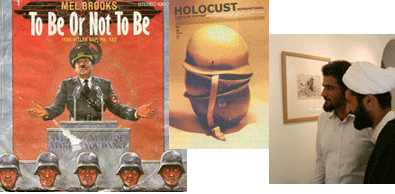
One of the top stories in today’s New York Times is called “Iran Exhibits Anti-Jewish Art.†This has all the media makings of another blown-out-of-proportion cartoonnami, especially since the exhibit was concocted by an Iranian newspaper (Hamshahri) in direct response to the Danish cartoons about Muhammad. Add to this the fact that more than 200 cartoons (of the 2000 plus submitted) are displayed in the Palestine Contemporary Art Museum in Tehran. So is this artistic tit for tat or just another op-ed tempest in a samovar?
As the reporter Michael Slackman notes, there appears to be more interest in the Western media than in Tehran: “The provocative theme may attract the attention of the West. But it has gone little noticed here. Over a three-day period the gallery was virtually empty. A few visitors stopped by, mostly art students who said they had visited to examine artistic techniques.†Even rabid anti-Zionist mullahs are not sending in busloads of followers to revel in the age-old protocol-typical stereotypes of the images.
There are all kinds of problems with the exhibit, not the least of which is adding bad taste to an already poisoned set of mutual misunderstandings. Chief among these, in my mind, is a fundamental pop-cultural misunderstanding of the organizers. One of the artists interviewed said that a main reason for the exhibit was because in the West it was alright to insult religion (the Danish case, for example) but not to question the holocaust. No matter what some people might have done to aggrandize the concentration camps and torture chambers in order to get sympathy, there is no question whatsoever among competent historians that several million Jews (and other groups) were systematically tortured and killed during the Nazi regime. This was an attempt at genocide and not to call it a holocaust is simply playing with words for political gain. Beyond this the numerous pogroms against Jews in the sordid history of both the West and Middle East are so well established that arguing against the holocaust is like saying Saddam Hussein never touched the Kurds. If there was no Auschwitz, there can be no Sabra and Shatila, no Halabja, no Sarajevo, no Darfur. None of us can pick and choose atrocities as though they are part of a popularity contest.
Another fundamental missing link in the rationale for this exhibit is the notion that the Holocaust is untouchable in the West. Tragedies are generally not very funny and for good reason. When a close family member dies, most of us are more prone to burst into tears than tell a dirty joke; that is a refreshing part of being human. There aren’t too many jokes specifically about Wounded Knee or Hiroshima either. Truly horrible atrocities do not lend themselves to humor, except in the cathartic release of “black humor.†And here is where the Hamshahri editors need a trip to New York, to see Mel Brook’s enormously popular The Producers, or Tel Aviv to gander at the equally self-stereotypical cartoons by Jewish artists in the Israeli Anti-Semitic Cartoons Contest. The point is that in Western secular society, cartoons do not cause wars and riots in the streets. There is nothing of the untouchable status in the Tehran exhibit that has not been touched for a laugh elsewhere.
The rationale is given by the creators that this exhibit is anti-Israel but not anti-Jewish, but that distinction has been so finessed on all sides that it becomes a meaningless alibi. This is like saying that the IDF was not attacking Lebanon but only Hizbillah or that Katusha rockets could be programmed not to fall on Palestinian Arab houses. Such abstract distinctions provide moral cover only with the lack of a reality check. Many of the cartoons in Iran (submitted from all over the world) are quite standard caricature fare for political cartoons, but others simply dredge up Nazi-era propaganda against Jews before there was a modern state of Israel.
The further irony here is that by turning swords into artist pens, it only encourages more sword fighting. Whatever the root causes of the fighting throughout the Middle East, the overriding problem today is an almost complete lack of trust on all sides. The next time you pray to Yahweh, the Trinity or Allah, or even if you just pray that people would have more common sense, please leave out all the craven images. If your God or patriotism is offended by lines on a piece of paper, whether in an obscure newspaper out to make money or a gallery of politicized art, just let that God go after the culprit. If you are offended, then close your eyes and open your mind.
Daniel Martin Varisco